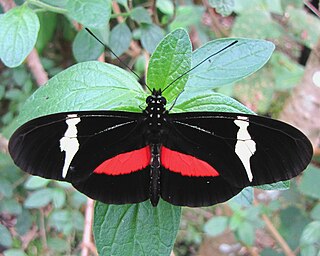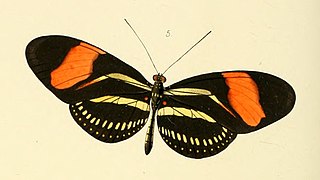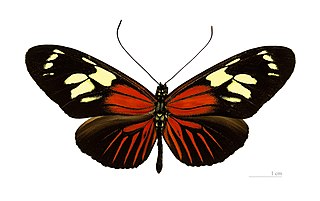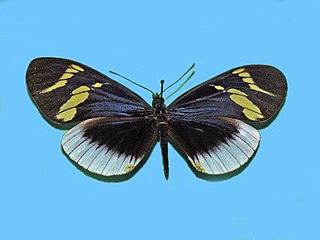
The Heliconiinae, commonly called heliconians or longwings, are a subfamily of the brush-footed butterflies. They can be divided into 45–50 genera and were sometimes treated as a separate family Heliconiidae within the Papilionoidea. The colouration is predominantly reddish and black, and though of varying wing shape, the forewings are always elongated tipwards, hence the common name.

Heliconius erato, or the red postman, is one of about 40 neotropical species of butterfly belonging to the genus Heliconius. It is also commonly known as the small postman, the red passion flower butterfly, or the crimson-patched longwing. It was described by Carl Linnaeus in his 1758 10th edition of Systema Naturae.

Heliconius cydno, the cydno longwing, is a nymphalid butterfly that ranges from Mexico to northern South America. It is typically found in the forest understory and deposits its eggs on a variety of plants of the genus Passiflora. It is a member of the Heliconiinae subfamily of Central and South America, and it is the only heliconiine that can be considered oligophagous. H. cydno is also characterized by hybridization and Müllerian mimicry. Wing coloration plays a key role in mate choice and has further implications in regards to sympatric speciation. Macrolide scent gland extracts and wing-clicking behavior further characterize this species.

Heliconius comprises a colorful and widespread genus of brush-footed butterflies commonly known as the longwings or heliconians. This genus is distributed throughout the tropical and subtropical regions of the New World, from South America as far north as the southern United States. The larvae of these butterflies eat passion flower vines (Passifloraceae). Adults exhibit bright wing color patterns which signal their distastefulness to potential predators.

Heliconius ismenius, the Ismenius tiger or tiger heliconian, is a butterfly of the family Nymphalidae found in Central America and northern South America. They are abundant as far south as Ecuador and Venezuela and as far north as southern Mexico, Guatemala and Belize. H. ismenius are more commonly called the tiger-striped long wing butterfly. H. ismenius's nickname is derived from its long wing structure as well as the beautiful burnt orange and black stripes. Pierre André Latreille, a French zoologist, described Heliconius ismenius in 1817. H. ismenius resembles a number of other butterflies, an example of Müllerian mimicry.

Heliconius doris, the Doris longwing or Doris is a species of butterfly in the family Nymphalidae. It is known for being a polymorphic species which participates in various Müllerian mimicry rings throughout Central America and the Amazon rainforest. It is a species of special interest in biological science for the genetic basis and role of polymorphism (biology) in ecology and evolution.

Heliconius hecalesia, the five-spotted longwing, is a species of butterfly of the family Nymphalidae. It is found from Central America to Venezuela and Ecuador.

Heliconius numata, the Numata longwing, is a brush-footed butterfly species belonging to the family Nymphalidae, subfamily Heliconiinae.

Heliconius clysonymus, the Clysonymus longwing, yellow longwing or montane longwing, is a species of Heliconius butterfly found in Central and South America.

Heliconius hermathena, the Hermathena longwing, is a species of butterfly of the family Nymphalidae. It is endemic to white sand areas of the Amazon basin. Heliconius hermathena is a sand forest nymphalid butterfly and they are typically lowland tropical forest organisms although a handful subspecies can be found in southeastern Brazil and part of the dry forests of Peru.
Heliconius hecuba, the Hecuba longwing, is a species of butterfly of the family Nymphalidae. It lives at altitudes ranging from 1000 to 2400 m in cloud forests in the northern Andes from Colombia to Ecuador.

Heliconius burneyi, the Burney's longwing, is a butterfly of the family Nymphalidae. It was described by Jacob Hübner in 1831. It is found in the Amazon basin. The habitat consists of tall forests.

Heliconius demeter, the Demeter longwing, is a butterfly of the family Nymphalidae. It was described by Otto Staudinger in 1897. It is found in the Northern and Eastern part of the Amazon basin, from Guyana to Northern Brazil and Peru. The habitat consists of sandy rainforests.

Heliconius ethilla, the ethilia longwing, is a butterfly of the family Nymphalidae. It was described by Jean-Baptiste Godart in 1819. It is found from Panama to southern Brazil. The habitat consists of marginal forests.

Heliconius aoede, the Aoede longwing, is a species of butterfly of the family Nymphalidae. It was described by Jacob Hübner in 1813. It is found in the Amazon basin. The habitat consists of deep forests.

Heliconius wallacei, the Wallace's longwing, is a butterfly of the family Nymphalidae. It was described by Tryon Reakirt in 1866. It is found from Venezuela and Trinidad to southern Brazil and Peru. The habitat consists of lowland rainforests.

Heliconius eleuchia, the white-edged longwing, is a species of Heliconius butterfly described by William Chapman Hewitson in 1853.





